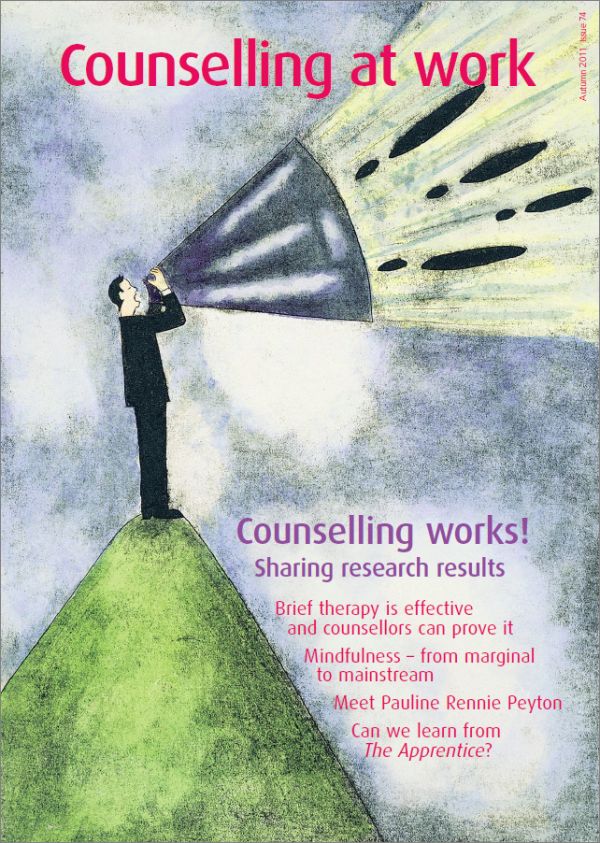In this issue
Time-limited counselling
Jill Collins, Colin Dyer and Diana Shave reflect on their research study
The Apprentice: a real message for the workplace?
Nicola Banning dissects the popular TV programme
Brief therapy within an EAP
Dr Kevin Wright reflects on his PhD research exploring cost-effectiveness with regard to gender and work-stress coping strategies
The interview
Dr Pauline Rennie Peyton – therapist, supervisor, mediator, life coach, author... and stone carver!
Mindfulness
Margaret Chapman explores the shift from marginal to mainstream and the implications for practitioners
We can all prove it!
Roger Sealy monitors his effectiveness as a workplace counsellor
Meet David Smith
Rick Hughes talks to the Chair of the UK EAPA
BACP Research Conference
John McLeod gives advice on how to submit a paper
Divisional news and chair’s report
Meet the new exec

Articles from this issue are not yet available online. Divisional members and subscribers can download the pdf from the Counselling at Work archive.
First words
At a time of financial austerity, we’re all being advised to tighten our belts and live more frugally. So on the basis of this sage advice, I thought it was an excellent time to mortgage myself to the hilt and splash out on a quirky 200-year-old former weaver’s cottage in Crieff in order to make it available for self-catering holiday lets.
But there was some logic here. My research showed that more Brits are taking self-catering holidays in Scotland than ever before, there is strong demand for accommodation for two or three people, and holiday makers are choosing locations like Perthshire because of the abundance of low-cost activities, such as walking, cycling, sailing, fishing and golfing. As I’m building my website, I’m reflecting on how to pitch the place. At first, I thought I’d focus on how this is a great ‘stress-free’ haven but then, reflecting on how terminology is changing, I have decided to focus on the ‘wellbeing’ attributes.
It might just be semantics but terminology has a significant bearing on how we view things. It taps into our value systems and can generate a more positive perspective. A ‘glass-half-full’ way of being can permeate through everything we do. It is this ‘positivity’ that grounds this journal.
An increasingly popular way of measuring effectiveness at work is by gauging ‘wellbeing’ and BACP Workplace was delighted to be able to provide a research completion grant to support Jill Collins and her team at Cambridge University Counselling Service for their excellent project concerning the impact of time-limited counselling on wellbeing. I don’t think I exaggerate by suggesting this is a seminal piece of research. This work could form the bedrock for the measurement of counselling services in almost any sector. The article provides a summary of the work and, in an exclusive for Counselling at Work, is the first formal publication of the research. You read it here first!
New exec member, Nicola Banning, draws from her BBC background to look at the good and the bad from the BBC’s recent run of The Apprentice, and identifies some intriguing nuggets of learning gleaned from the show.
Kevin Wright has spent over a decade researching brief therapy and EAPs, and shares with us some fascinating insights into cost-effectiveness in relation to gender and coping skills.
We continue our Interview series and welcome Pauline Rennie Peyton, author of Dignity at Work, which is available from all good bookstores.
Back to wellbeing, I’m delighted to introduce Margaret Chapman, who I met at the Health & Wellbeing @ Work conference earlier this year, and thank her for her absorbing article on mindfulness and emotional intelligence.
Roger Sealy responds to the rallying cry issued by Barry McInnes in the last issue to ‘Prove It!’ Roger does so admirably by highlighting how he monitors and measures his own effectiveness as a counsellor with his clients.
In recognition of the forging relationship between the Employee Assistance Professionals Association (EAPA) and BACP Workplace, we’re pleased to congratulate David Smith on his accession to Chair of EAPA. David spells out the road ahead.
And finally, John McLeod helps us consider how best to submit a research paper for publication. John is a keen supporter of BACP Workplace and his encouragement is greatly appreciated.
As I sign off for another issue, I’m mindful of a recent experience at a local antiques auction, where I bid for a set of William Morris Arts and Crafts-style dining chairs for the holiday cottage. My own stress levels were rising as fast as the bid, until my partner pointed out that I was bidding for the set, not each individual chair. On realising this, both my hands went up in joy and I probably bid against myself. Emotional intelligence went out the window. I was living in the moment, savouring the flow of mindfulness.
But I got the chairs. Not only do they contribute significantly to my own personal wellbeing but they make eating food at the dining table so much more practical.
I hope you enjoy this issue.
Rick Hughes
Editor
